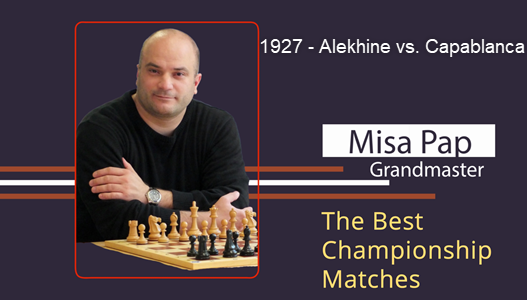Added on 3/18/2021

After his win against Lasker in 1921, Capablanca became the world champion. Maybe because he had big problems challenging Lasker (the first time he tried it in 1911), it was not easy to challenge Capablanca. They had some "London rules" about how the match should be organized and who could challenge the Champion. Also, a clause read that the prize fund should be at least 10.000 USD in that time (which is more than 100,000 in today's money). Rubinstein and Nimzowitch challenged Capablanca for the match, but only Alekhine managed to raise sufficient cash to challenge the Champion.
Eventually, the match was organized, and it was played in 1927 in Buenos Aires, Argentina. The match was played to the best of 6 wins, but in a 5-5 tie, the Champion would retain the title. Pretty unfavorable for the challenger. Before the match, Alekhine never beat Capablanca, so the prediction was easy: Capa would win.
But Alekhine was preparing with all his might, and he played the New York tournament in 1927 "just to prepare better for the match," as he wrote himself in the tournament book.
While Capablanca had a clear and intuitive playing style, usually playing robust and straightforward and being an endgame virtuoso, Alekhine was a master of complicated play, and he usually played very energetically, often with crushing attacks. But he knew that against Capablanca, he had to play more solid if he wanted to win.
Alexander Alekhine
Thus, for the first time, we had an enormous number of draws in a title match! Alekhine managed to win 6-3 with 25 draws, which is impressive for that time! And it was a big upset, as almost everybody expected Capablanca to win.
Capablanca in 1931
After the match, Alekhine declared that he was ready to give Capablanca a rematch under the same "London rules." The negotiations for a rematch dragged on for years. In the meantime, Alekhine defended his title easily against Bogoljubov in 1929, winning 11-5 with 9 draws, and in 1934, winning 8-3 with 15 draws.
After that, in those complex 1930s, Alekhine surprisingly lost a match to Max Euwe! They played in 1935 in 13 cities in the Netherlands, and Euwe won 9-8 with 13 draws. After that came a rematch in 1937, which we will see in our next video.
